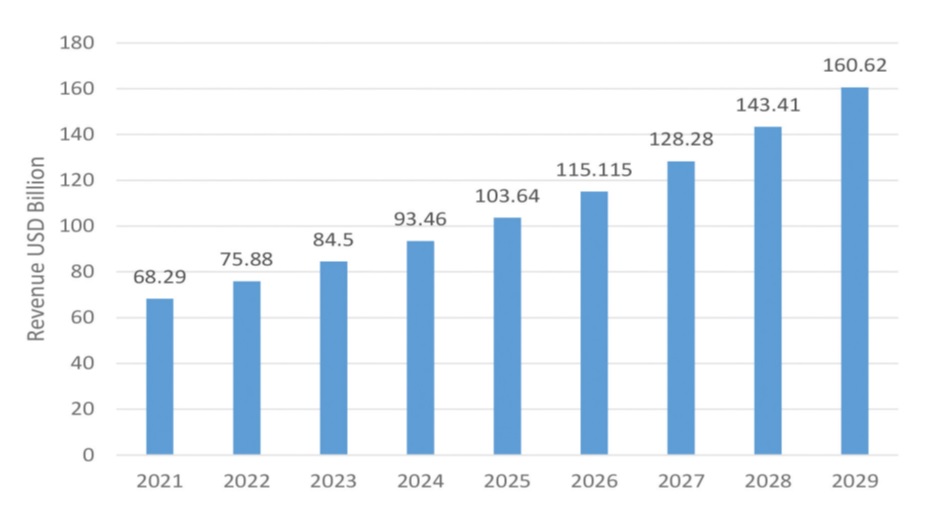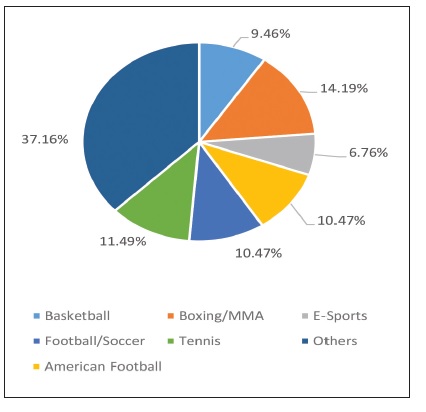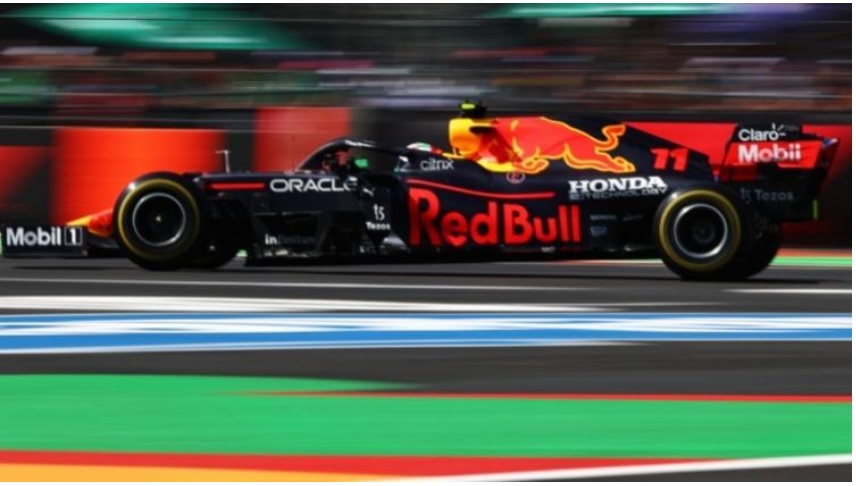Report provided by Global Market Estimates Research & Consultants
Sports betting can be described as betting on the results of various outcomes of sports matches like football, cricket, and others. Sports betting is only legal in some sections of the world and most sports betting occurs illegally through enterprises called bookmakers or “bookies”.
There are many types of bets like money-line bets (bets on the winning teams), point-spread bets (bets on the team winning/losing by specific margins), proposition bets (bets on specific events within a game, such as the first team to score or the number of goals scored by a particular player). Sports betting is a vast market valued at USD 84.5 billion in 2023 and is expected to reach USD 160.62 billion in 2029, exhibiting a CAGR of 11,44 percent between 2024 and 2029. Request a sample copy of the report at “Global Sports Betting Market – Forecasts to 2029.” (Report link: https://www.globalmarketestimates.com/market-report/sports-betting-market-4375)
It can be observed from the above graph that the market is estimated to witness significant growth by 2029. The following sections highlight the trends and opportunities of the market that will affect its growth globally, and regionally.
Figure 1 Global Sports Betting Market: Revenue Growth Forecast to 2029
Sports Betting Market: Market Drivers
Sports betting has been a long time tradition in the sports industry and covers many sports like cricket, football, hockey, American football, baseball, and many others. The market has steadily grown since the 2000s and continues to grow due to various drivers. One of the major drivers responsible for the growth of the global sports betting market is the increasing digitization of betting platforms. Previously, gamblers had to physically place bets with various “bookies,” which resulted in both parties frequently defaulting on the bets. Digitizing the data acts as insurance for both parties, driving the demand for digitizing gambling platforms. Moreover, people have started to utilize various AIs to predict the results of the games, which further drives the market growth. Digitization acts as a precursor to the rise of online gambling, which has transformed the gambling industry. Online gambling has been on the rise, especially during the COVID-19 pandemic, which caused a total lockdown in most countries.
While sports betting is illegal in many parts of the world, the market is growing due to various regional factors. The presence of a vast number of tech companies like Bait and Odd Hacker, who create online betting platforms in the United States, is a significant driver for the market growth in the U.S. These companies offer many forms of gambling, including sports betting for a large variety of popular sports in the U.S. like American football, baseball, and basketball. Another important market driver is the huge fan base of European football clubs. Football is the most popular sport in Europe, especially in countries like France, Spain, Germany, the UK, and Italy. Europe holds the largest market share of the global sports betting market. The recent FIFA World Cup held in 2022 has generated huge revenue for betting companies across Europe, such as Betfect (UK), Pudding (France), and DaznBet (Spain), among others. While sports betting (except horse race betting) is not legal in India, the country has also observed many illegal bets during the ICC Cricket World Cup held in 2023. As per The Telegraph, the World Cup had marked nearly USD 100 billion worth of bets, according to the Think Change Forum report. All these factors have contributed to the growth of the global sports betting market.
Sports Betting Market: Market Restraints
While the sports betting market is growing due to several market drivers, there are also market restraints that hinder its growth. Sports betting is very addictive, especially in young adults, which often results in negative impacts on their mental health. People losing their bets have shown heightened levels of depression and aggression, which has prevented many countries from legalizing betting. Also, while online betting has been rising in the past few years, governments impose heavy restrictions on online betting. These restrictions hinder new gamblers from entering the sports betting market.
One of the most significant market restraints is the ban on sports betting in major countries like China and India. China has strictly banned all forms of gambling except the Welfare Lottery and China Sports Lottery in the mainland. Chinese authorities have arrested more than 100,000 people for illegal gambling in 2021 alone. Sports betting has been legal under the China Sports Lottery since 1994 and only allows Chinese citizens to bet on international football matches. India has also banned all types of sports betting except betting on horse racing, which acts as a market restraint for the global sports betting market and results in the creation of various illegal sports betting enterprises.
Figure 2 Share of Different Sports in the Sports Betting Market
Sports Betting Market: Market Opportunities
The top opportunities for sports betting companies worldwide include investing in the research and development of the digital infrastructure involving betting websites and applications. This research and development will improve network connectivity and data security, and develop a standard financial platform that can provide secure transactions to individuals. Companies can also invest in developing proper digital interfaces that help gamblers track their data. The integration of blockchain technology and artificial intelligence to predict outcomes based on parameters will entice new consumers into betting on sports. Moreover, companies can work on developing augmented reality and virtual reality into gambling platforms to provide a unique experience to their consumers. The integration of real-time analysis into betting platforms also allows many companies to grow in the market.
Sports Betting Market: Regional Legalities
This section will describe the legal regulation of sports betting across various countries in the world. The U.S. had banned sports betting for a long time, but the Supreme Court of the United States decided to lift the ban and allow states to implement their own laws regarding sports betting. Canada has legalized sports betting since 1985.
While the European Union legalized sports betting in 2014, it is subjected to many restrictions like the GDPR, the Fourth Anti-Money Laundering Directive, and the Consumer Rights Directive to prevent criminal activities like money laundering. Sports betting has been legal in Italy since the Mussolini era, and all gambling activities were regulated by the Legislative Decree No. 496 of 1948. Later, in 2006, the country also legalized online sports betting.
In Latin America there is no strict legislation on legal betting, but it is not explicitly illegal. Countries like Mexico, Puerto Rico, Chile, and Argentina generate huge revenue from sports betting. The provinces enabling sports betting activities in Argentina are licensed by the Lottery of the City of Buenos Aires. In December 2023, Brazil passed Bill PL3626/23 and many financial regulations on betting platforms. The country announced its plan to set up a legal sports betting marketplace for its citizens. This legislation is expected to be well received by the citizens, given the country’s tremendous support for football.
In Africa, sports betting is legal and is extremely popular in countries like Kenya and Nigeria. Sports betting is legal in Nigeria, as the Nigerian Lottery Regulatory Commission regulates brick-and-mortar and online activities. The industry is quite relevant for the country, as it represents an income source for the state, and provides jobs and businesses for small and medium local companies. Kenya legalized sports betting in 1966 by establishing the Betting & Licensing Board.
In the Asia Pacific region, many countries like China, India, and South Korea have banned gambling, but they have specific laws on betting on a few sports, such as international football in China and horse racing in India. India has banned gambling based on the Technology Act of 2000 and the Gambling Act of 1986. However, the country allows states to legislate their regulations on the subject. In this context, states like Sikkim, Meghalaya, and Nagaland provide laws that authorize sports betting.
The Philippines is known to be a betting-friendly country, and two parties govern sports betting here. The First Cagayan Resort & Leisure Corporation controls the Cagayan-Freeport area, while the rest of the country is governed by the Philippine Amusement & Gaming Corporation (PAGCOR). Macau and Hong Kong are some of the most famous countries which have legalized gambling and sports betting. Macau generates annual revenue comparable to Las Vegas in the United States. Australia has also made sports betting legal in their country, but people can only place their bets before the matches start. The country has banned people from placing bets after matches start, according to the Australian Interactive Gambling Act 2001 (IGA).
Sports Betting Market: Global & Regional Market Players
The key players operating in the global sports betting market include 888 Holdings PLC, Bet365, Betsson AB, Churchill Downs Inc., Entain PLC, Flutter Entertainment PLC, Kindred Group PLC, Sportech PLC, and William Hill PLC, among others.
The United States has many companies that provide a platform for sports betting, including Boom Entertainment, Bait, Odds Hacker, Prophet Exchange, Betr and Wunderdog Sports Picks among others. Top sport betting enterprises in Europe are Betfect (UK), Scorefam (UK), Bettingrunner (UK), Betadviser (UK), Pudding (France), Libero (Germany), Collbet (Germany), Codere (Spain), and DaznBet (Spain), among others.
Conclusion
In conclusion, sports betting has been a cornerstone of the sports industry for a very long time. The presence of a huge number of betting companies further bolsters the market and drives its growth. The rise of online gambling and increasing digitization are significant market drivers. The legal sports betting market projects a considerable figure, but this is a small share compared to the illegal sports betting market. Chinese laws have proven to be major hindrances in the global market. The imposition by China on gambling-rich countries like Macau and Hong Kong has led to uncertain future predictions for the sports betting market in the countries. Most of the betting companies are based in Europe due to their gambling-friendly regulation, and these companies provide their services to many countries like India, where gambling is illegal. Like the United States, India has left the formulation of sports betting laws to the states’ discretion. Overall, the global sports betting market is expected to grow significantly between 2024 and 2029.
Preview Image: Shutterstock
*** This Report was originally published in January 2024 Edition of Sports Betting Operator Issue 009 ***
























